Tuan-Luc Huynh
PromptDSI: Prompt-based Rehearsal-free Instance-wise Incremental Learning for Document Retrieval
Jun 18, 2024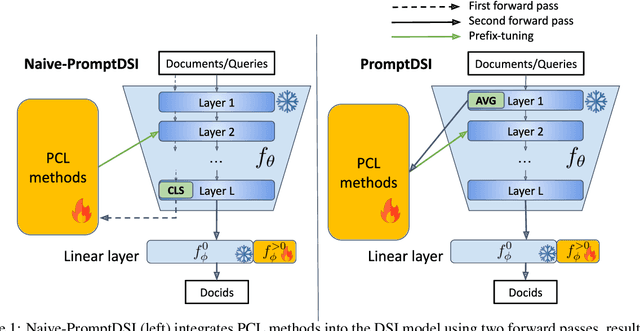
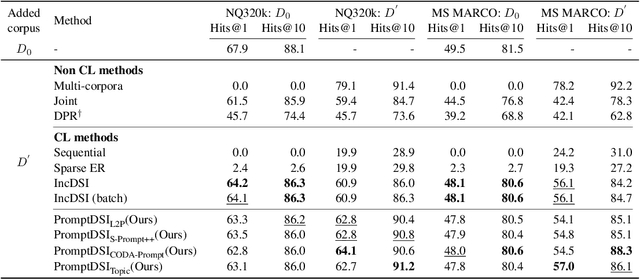
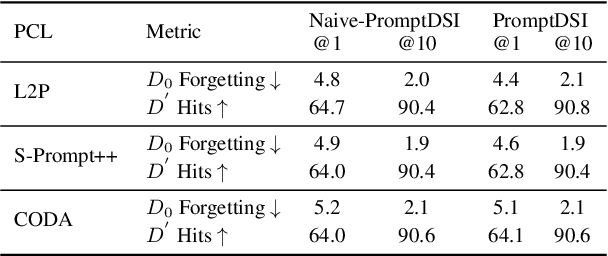
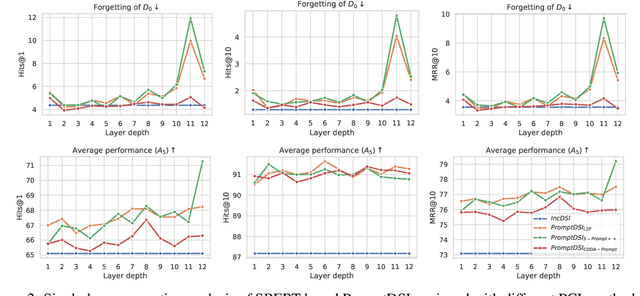
Abstract:Differentiable Search Index (DSI) utilizes Pre-trained Language Models (PLMs) for efficient document retrieval without relying on external indexes. However, DSIs need full re-training to handle updates in dynamic corpora, causing significant computational inefficiencies. We introduce PromptDSI, a rehearsal-free, prompt-based approach for instance-wise incremental learning in document retrieval. PromptDSI attaches prompts to the frozen PLM's encoder of DSI, leveraging its powerful representation to efficiently index new corpora while maintaining a balance between stability and plasticity. We eliminate the initial forward pass of prompt-based continual learning methods that doubles training and inference time. Moreover, we propose a topic-aware prompt pool that employs neural topic embeddings as fixed keys. This strategy ensures diverse and effective prompt usage, addressing the challenge of parameter underutilization caused by the collapse of the query-key matching mechanism. Our empirical evaluations demonstrate that PromptDSI matches IncDSI in managing forgetting while significantly enhancing recall by over 4% on new corpora.
SketchANIMAR: Sketch-based 3D Animal Fine-Grained Retrieval
Apr 12, 2023Abstract:The retrieval of 3D objects has gained significant importance in recent years due to its broad range of applications in computer vision, computer graphics, virtual reality, and augmented reality. However, the retrieval of 3D objects presents significant challenges due to the intricate nature of 3D models, which can vary in shape, size, and texture, and have numerous polygons and vertices. To this end, we introduce a novel SHREC challenge track that focuses on retrieving relevant 3D animal models from a dataset using sketch queries and expedites accessing 3D models through available sketches. Furthermore, a new dataset named ANIMAR was constructed in this study, comprising a collection of 711 unique 3D animal models and 140 corresponding sketch queries. Our contest requires participants to retrieve 3D models based on complex and detailed sketches. We receive satisfactory results from eight teams and 204 runs. Although further improvement is necessary, the proposed task has the potential to incentivize additional research in the domain of 3D object retrieval, potentially yielding benefits for a wide range of applications. We also provide insights into potential areas of future research, such as improving techniques for feature extraction and matching, and creating more diverse datasets to evaluate retrieval performance.
Multilingual Communication System with Deaf Individuals Utilizing Natural and Visual Languages
Dec 01, 2022Abstract:According to the World Federation of the Deaf, more than two hundred sign languages exist. Therefore, it is challenging to understand deaf individuals, even proficient sign language users, resulting in a barrier between the deaf community and the rest of society. To bridge this language barrier, we propose a novel multilingual communication system, namely MUGCAT, to improve the communication efficiency of sign language users. By converting recognized specific hand gestures into expressive pictures, which is universal usage and language independence, our MUGCAT system significantly helps deaf people convey their thoughts. To overcome the limitation of sign language usage, which is mostly impossible to translate into complete sentences for ordinary people, we propose to reconstruct meaningful sentences from the incomplete translation of sign language. We also measure the semantic similarity of generated sentences with fragmented recognized hand gestures to keep the original meaning. Experimental results show that the proposed system can work in a real-time manner and synthesize exquisite stunning illustrations and meaningful sentences from a few hand gestures of sign language. This proves that our MUGCAT has promising potential in assisting deaf communication.
SHREC'22 Track: Sketch-Based 3D Shape Retrieval in the Wild
Jul 11, 2022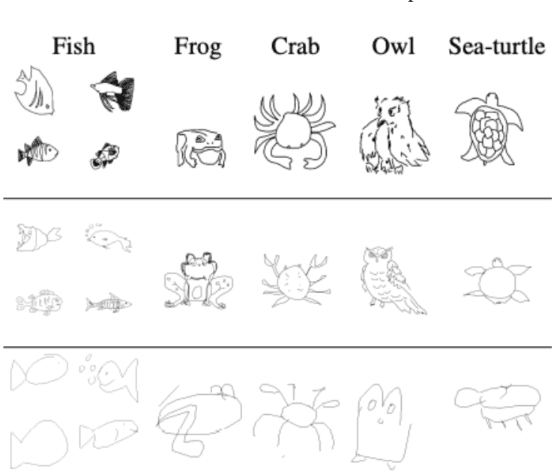

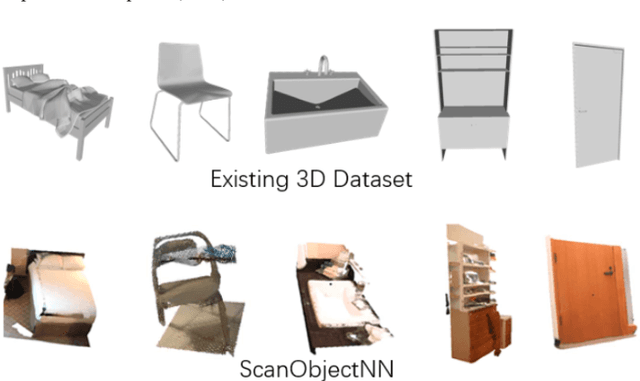

Abstract:Sketch-based 3D shape retrieval (SBSR) is an important yet challenging task, which has drawn more and more attention in recent years. Existing approaches address the problem in a restricted setting, without appropriately simulating real application scenarios. To mimic the realistic setting, in this track, we adopt large-scale sketches drawn by amateurs of different levels of drawing skills, as well as a variety of 3D shapes including not only CAD models but also models scanned from real objects. We define two SBSR tasks and construct two benchmarks consisting of more than 46,000 CAD models, 1,700 realistic models, and 145,000 sketches in total. Four teams participated in this track and submitted 15 runs for the two tasks, evaluated by 7 commonly-adopted metrics. We hope that, the benchmarks, the comparative results, and the open-sourced evaluation code will foster future research in this direction among the 3D object retrieval community.
 Add to Chrome
Add to Chrome Add to Firefox
Add to Firefox Add to Edge
Add to Edge